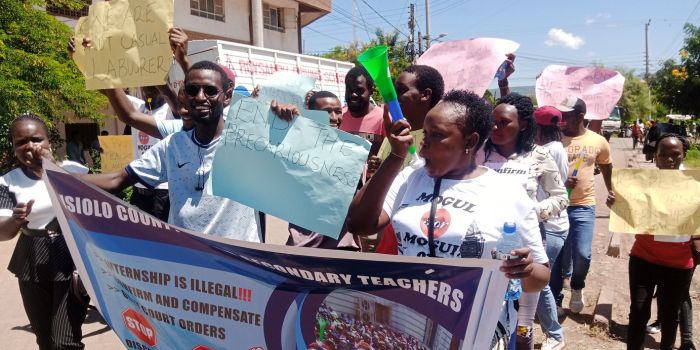JSS teachers seek independence from unions, blame them for neglecting their rights

While highlighting how salary increments and other demands raised by JSS teachers had gone unmet, national spokesperson Omari Omari emphasised that it was time for a change.
Junior Secondary School (JSS) teachers have criticised the Kenya National Union of Teachers (KNUT) and the Kenya Union of Post-Primary Education Teachers (KUPPET), arguing that the unions have failed to advocate for their rights.
The teachers have now called for their independence to address the challenges they face in managing students and schools, free from the constraints of primary school administration.
More To Read
- TSC announces recruitment of 9,159 teachers nationwide
- Over 30,000 teachers set for senior school curriculum training ahead of 2026 transition
- Education Ministry pledges early capitation release for smooth start to new term
- Ruto announces recruitment of 24,000 more teachers by January to ease national shortage
- Intern teachers warn they will not resume duties in January without permanent status
- KUPPET flags stalled promotions, internship contracts for teachers
While highlighting how salary increments and other demands raised by JSS teachers had gone unmet, national spokesperson Omari Omari emphasised that it was time for a change.
"This is the time to advocate for our independence, and we can no longer continue suffering in silence. JSS teachers are paid a meagre Sh17,000 per month, which is not enough to cater for our needs, including paying rent in Nairobi," Omari said during a luncheon in Nairobi on Saturday to mark World Teachers’ Day.
He also called for restructuring of the Teachers Service Commission (TSC) to include teachers as members, drawing comparisons to other commissions like the Judicial Service Commission (JSC) and Parliamentary Service Commission (PSC), which include representatives from their respective professions.
"TSC should have teachers to adequately address teachers' welfare," he said.
Nairobi Senator Edwin Sifuna, who also serves as the Secretary-General of the Orange Democratic Movement (ODM), noted that the party had previously advocated for teachers' inclusion in the TSC under the Building Bridges Initiative (BBI), but it failed.
“It is high time we pushed for this to ensure the well-being of teachers. Under BBI, ODM also proposed the formation of the Health Service Commission to address health issues, but unfortunately, it did not come to pass,” he said.
Sifuna expressed concern over the low pay received by JSS teachers, saying that Sh17,000 is insufficient to meet their needs in Nairobi.
“Teachers are key in society, and their welfare should come first. As legislators, we shall do all it takes to ensure your voices are heard,” Sifuna said.
Meanwhile, Kenya Secondary Schools Heads Association (KESSHA) Chairman Willy Kuria, who was also present at the event, reiterated the union's proposal to move Grade 8 and 9 students to secondary schools due to a lack of resources in primary schools.
Kuria stated that discussions would be initiated with the Ministry of Education to facilitate the transition. Currently, Junior Secondary School (JSS), which includes Grades 7 to 9, is based in primary schools.
The National Treasury has defended the government’s preparedness to host Junior Secondary School (JSS) classes in primary schools starting in 2025, stating that it has disbursed a total of Sh7.8 billion to fund the construction of 16,000 JSS classrooms across the country.
According to Treasury Cabinet Secretary John Mbadi, Sh3.4 billion has been directed to the National Government Constituency Development Fund (NGCDF) Board as part of the Ministry of Education's share, another Sh 3.4 billion was allocated to NGCDF as matching fund and Sh1 billion was specifically set aside for Nairobi County NGCDF.
The first cohort entered Grade 8 in January 2024, with Grade 9 commencing in 2025. The 2025 Grade 9 class will be the first to complete junior secondary under the CBC.
Top Stories Today











































